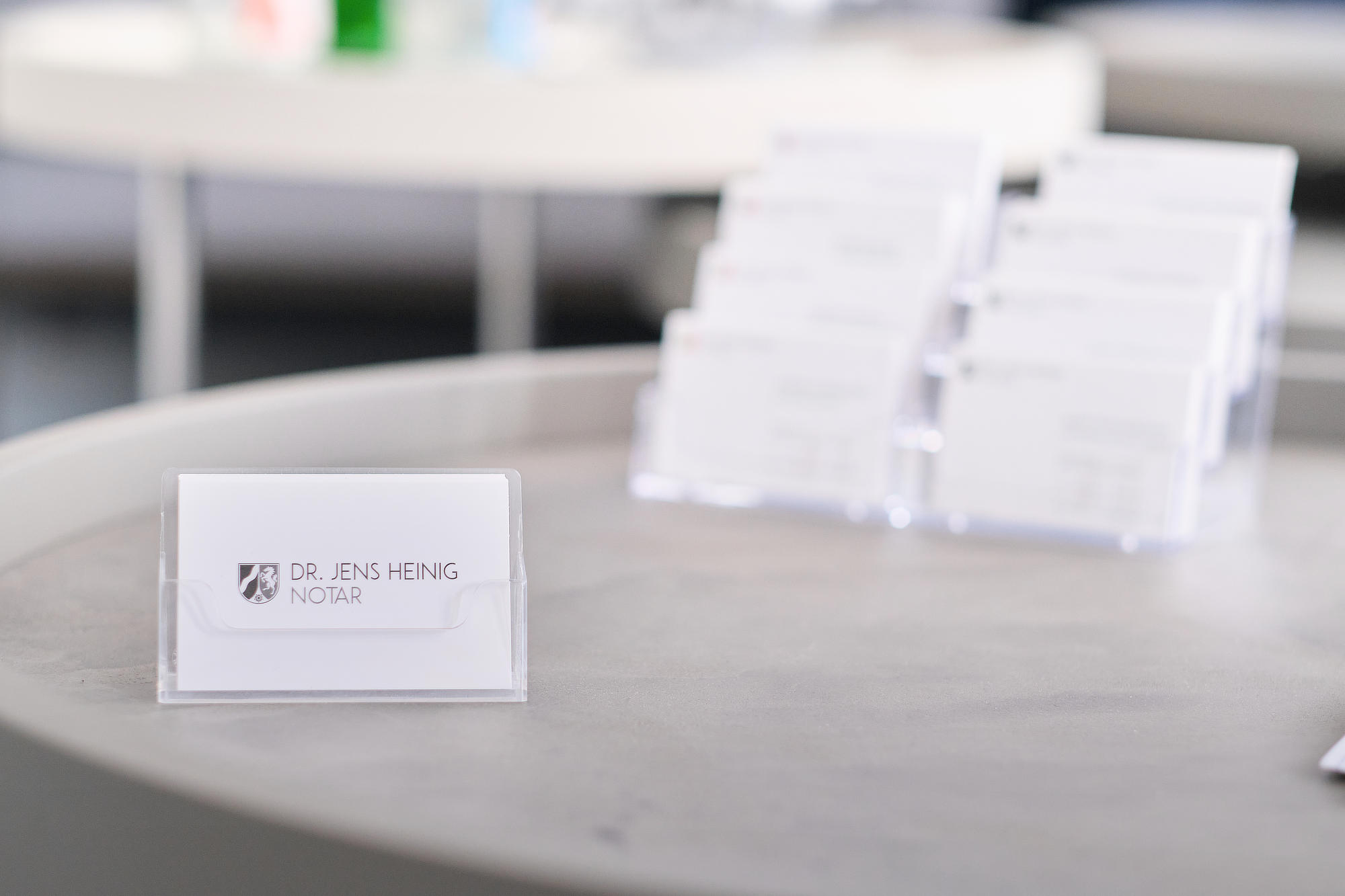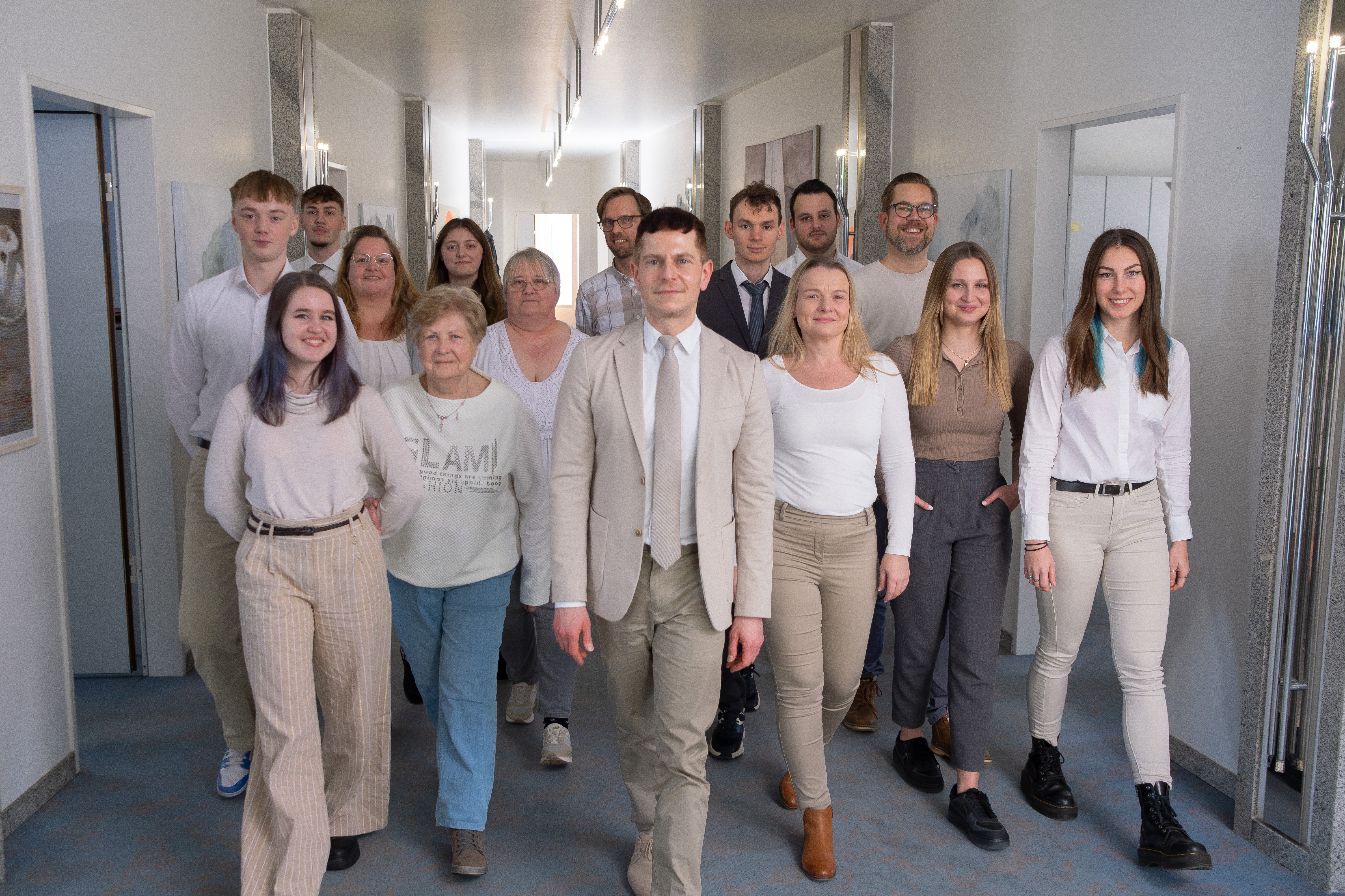Why are we working for you?
We are convinced that your private and professional plans as well as personal events require a suitable arrangement for you. This arrangement should be individually tailored to your needs, cover future developments, and be legally secure and stable. We want to advise and help you along this path. We would like to help you to recognize your own needs, show you suitable design paths and deletion proposals and implement them together with you. In this way, we would like to contribute to reliability, transaction security and trust among you, your relatives and your business partners.

Who is the notary?
The notary advises, drafts, notarizes and certifies contracts, dispositions of property upon death, registration authorizations, register applications and other legally relevant documents for you. The notary is a qualified lawyer who has passed both legal state examinations, undergone a selection procedure and completed several years of training (trainee service) in the area of the notary's office only (as in the Rhineland). The notary acts neutrally and impartially in the area of preventive administration of justice. He must clarify the will of the parties involved, formulate their declarations accordingly and instruct the clients about the transaction.

For which contracts and declarations do I need a notary?
Notarization or certification is always required if the law prescribes it. The most important responsibilities of the notary lie in property law, inheritance and family law as well as company law. In real estate law, these are in particular contracts for the sale of real estate (including residential and partial ownership) as well as the creation, revocation and amendment of rights in rem (such as land charges or usufruct). In family law, marriage contracts (including agreements on the consequences of divorce) and adoptions in particular require notarization. In inheritance law, the notary is responsible for notarizing inheritance contracts. Wills can be drawn up before a notary or handwritten by yourself. However, a notarized will has several advantages. You can also have applications for a certificate of inheritance notarized by a notary. Inheritance notices must be notarized. In company law, various processes require notarization, such as the formation of corporations and amendments to the articles of association (in particular capital increases), as well as all transformation measures (also for partnerships). Registrations in the commercial, association, partnership and cooperative registers must always be notarized.

Why do these transactions have to be notarized or certified?
The notarization has various functions:
Advisory function: The notary advises the parties involved on the legal effects of the transaction. In this way, the notary ensures that the parties are aware of the content and consequences and that the transaction corresponds to their wishes.
Control function: The notary guarantees that transactions are only concluded in accordance with the legal system and, in particular, are neither illegal nor immoral. The legislator also ensures that the notary notifies other competent authorities (e.g. the tax office or the expert committee) of the transaction if necessary.
Warning function: Notarization is mandatory for particularly important transactions. It ensures that the parties involved are aware of the high significance and scope of the transaction and only legally bind themselves after careful consideration.
Evidence function: Notarization provides full proof that the parties have made the declarations set out in the deed. In this way, the exact content of important transactions can always be traced precisely and reliably.
Pacification function: The notary discusses any questions that may arise in the future with the parties involved and regulates them in the deed. In this way, the solution to later questions often arises directly from the deed and conflicts are avoided.
Enforcement function: The parties involved can submit directly to enforcement in a notarial deed. This means that one party does not first have to bring an action before a court if the other party does not fulfill its obligations (e.g. does not pay the purchase price). Instead, the respective party can obtain an enforceable copy of the deed from the notary and proceed directly with enforcement (e.g. instruct a bailiff or apply to the enforcement court for an attachment of accounts). This saves the time and costs of litigation.
The notarial signature certification provides conclusive evidence that a signature originates from a specific person. This is necessary in many procedures to ensure that a declaration was actually made personally or by the true authorized party. In the case of declarations made in certain registers (commercial register, land register, register of associations, register of property rights), the notary is also obliged to check in advance whether the declaration is eligible for registration (even if the declaration was not prepared by the notary). Notarial certification therefore contributes to the accuracy and reliability of the registers kept in Germany and thus to legal certainty.

What is the difference between a notarization and a certification?
When notarizing signatures, the notary certifies that a signature has been made (or acknowledged) before him, as well as the identity of the person who has signed. Notarization, on the other hand, does not refer to the text in front of the signature. The notarization on the other hand, covers the entire content of the deed: in this case, the deed provides evidence that the parties have made the declarations as set out in the deed. When certifying a copy, the notary certifies that the copy of a deed corresponds to the original submitted.

Why does the notary have to read out everything during the notarization?
Reading aloud during the notarization ensures that you are fully aware of the content of the transaction and the scope of your declarations. We often find that reading out the content makes it easier for you to understand. This is particularly because the notary explains the content in a way that you can understand and answers your questions. In some cases, this leads to adjustments being made to the text so that the deed corresponds to your wishes and needs. At the end of the notarization, you will often think: “It's good that we went through everything again.”

How high are the fees for notarial services?
Notary fees are set by law and are therefore the same for all notariesin Germany. The fees are generally determined by the transaction value and a specific fee rate. For example, in the case of a regular property purchase agreement, the purchase price is the relevant transaction value. In the case of a will, it depends on the testator's financial circumstances.

Are there separate fees for consultations or hourly fees?
The fees for notarization are fixed or value fees that are incurred regardless of how many consultations the notary has had or how many hours he has worked on the matter. The fees therefore remain the same, even if you make use of a further consultation or request changes to the draft. You will be charged a standard fee for the notarization, which is generally determined by the value of the matter (see above). The notary fees are therefore “all inclusive”.
Examples: A testator has assets of € 100,000. The notarization of the will costs € 273 (plus VAT and expenses). For assets of € 500,000, notarization costs € 935 (plus VAT and expenses). These amounts already include advice and drafting. This also applies if you come back for a consultation or wish to make changes to the draft at a later date.
If you only take advantage of a consultation but do not end up with a draft contract or notarization, the fees are often lower.

Can I choose the notary freely?
You are free to choose a notary. You are not obliged to consult a notary in your home town. It is also irrelevant if the matter relates to a specific city, for example if the property in question is located in a specific city. Even then, you can instruct a notary in another city - even in another federal state.
Example: Even if a property is located in Berlin, Hamburg or Stuttgart, you can commission a notary in a completely different city to draw up and notarize the contract.
However, the appointments for the notarizations (i.e. the reading out, explanation and signing of the deed) must generally take place in the notary's official area. The official area is the district of the local court in which the notary is based. The notary is generally not permitted to hold notarization appointments outside his official district. For Monheim am Rhein, the district of the Local Court of Langenfeld is decisive. Nevertheless, the facts of the case - as described - may also relate to a completely different city. The property sold can therefore also be located in another, distant town. Only the notarization itself (i.e. the appointment) must take place in the notary's district.
Example: The notarization of a purchase contract for a property in Berlin, Hamburg or Stuttgart can also be carried out by a notary in a completely different city (i.e. also in the district court district of Langenfeld). However, the parties involved must come to the notary's office for the notarization appointment (i.e. the reading, explanation and signing of the deed).

Do I have to appear in person at the notary's office?
It often happens that the parties to a contract live far away in different cities and are therefore unable to attend a notary appointment together. In this case, a party can also be represented at their request. However, it is always preferable for a party to appear in person at the notary's office so that they can be advised directly and ask questions. However, if this is not possible due to distance, the parties involved should preferably be represented by a trusted person (e.g. family member or lawyer). If this is also not possible, the parties involved can also be represented by a non-authorized representative. In this case, you must subsequently approve the statements made by this non-authorized representative. As a rule, this approval must also be obtained from a notary; the approver's signature must then be notarized. However, the authorizing party can choose a notary in their vicinity for the certification.
Example: The seller of a property is resident in Hamburg. The buyer lives in Cologne. The property is located in Saxony. The parties have the deed notarized by a notary in the district of Langenfeld. The buyer from Cologne comes to the appointment in person. The seller from Hamburg cannot come to the appointment in person and cannot authorize a trusted person (e.g. family member, lawyer). The seller is therefore represented at the appointment by a representative (e.g. an office employee) without power of attorney. The representative signs the contract on behalf of the represented seller. After notarization, the notary sends a copy of the contract and a prepared declaration of approval to the seller from Hamburg. The seller from Hamburg then goes to a notary in his area. There he has his signature notarized under the declaration of approval. The seller himself or the certifying notary sends this notarized declaration of approval to the notary in the district of Langenfeld who notarized the purchase contract. The purchase agreement becomes effective upon receipt of the approval by the certifying notary. The notary can then execute it.

Are out-of-town appointments also possible?
In the district of the Local Court of Langenfeld, out-of-town appointments are also possible if, for example, a party is unable to come to the office for health reasons. Outside the district of the Local Court of Langenfeld, appointments away from the office are only possible in exceptional cases where there are special reasons.

What does an out-of-town appointment cost?
For appointments away from home, an additional fee of € 50 per half hour or part thereof is charged by law. However, if the notary notarizes a disposition of property upon death (will or contract of inheritance) and/or a health care proxy, the fee is always only € 50 per testator/proxy, regardless of the duration of the appointment.

When do appointments take place?
Appointments in our office generally take place Monday to Friday between 9:00 and 19:00. In justified exceptional cases, appointments are also possible outside these times. Please contact us for this!

















